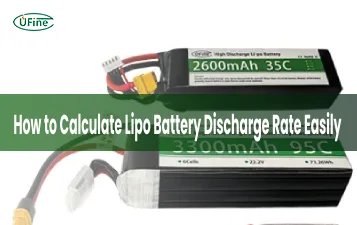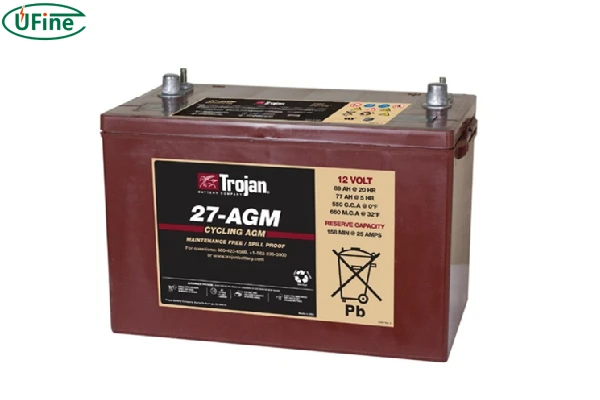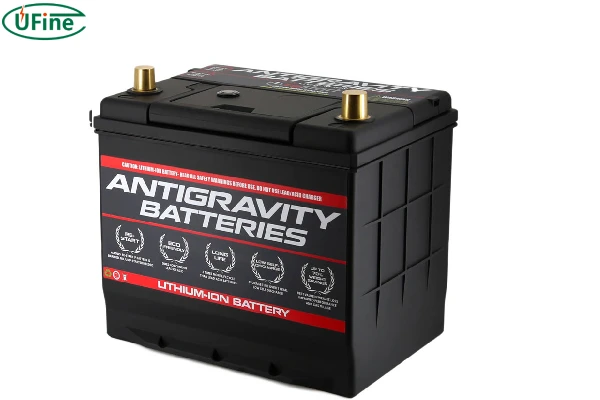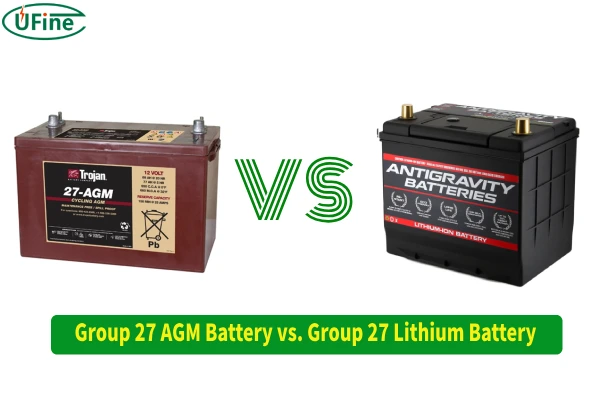Choosing the right battery for your needs can be challenging, especially with so many options available. This article will help you understand the differences between Group 27 AGM and Group 27 lithium batteries. We’ll explore their features, advantages, and disadvantages and make a side-by-side comparison. By the end, you should have a clear idea of which battery type is best suited for your specific requirements.
Part 1. Understanding Group 27 AGM battery
A Group 27 AGM (Absorbent Glass Mat) battery is a specific type of lead-acid battery that uses a glass mat to absorb the electrolyte. This design innovation makes AGM batteries spill-proof, maintenance-free, and highly reliable. They are commonly used in applications that require a steady and reliable power source, such as in boats, RVs, and backup power systems.
Features of Group 27 AGM Battery:
- Spill-Proof Design: The electrolyte is absorbed in a glass mat, preventing spills and leaks.
- Maintenance-Free: Unlike traditional lead-acid batteries, AGM batteries do not require regular maintenance, like adding water.
- Vibration Resistant: Their robust construction makes them ideal for environments with high vibration, such as marine and RV applications.
- Deep Cycle Capability: Designed to provide a consistent power output over long periods, they are perfect for applications requiring prolonged energy supply.
Part 2. Group 27 AGM battery pros and cons
Pros of Group 27 AGM Battery:
- Durable and Robust: Can withstand rough conditions and high vibrations.
- Reliable Performance: Provides consistent and dependable power.
- Affordable Option: Generally more cost-effective compared to lithium-ion batteries.
- Safe and Spill-Proof: No risk of electrolyte spillage, making them safer to use and handle.
Cons of Group 27 AGM Battery:
- Heavier Weight: Generally heavier than lithium batteries, making them less portable.
- Shorter Lifespan: Typically have fewer charge and discharge cycles compared to lithium batteries.
- Lower Efficiency: Charge and discharge less efficiently, leading to slower charging times.
- Limited Energy Density: Store less energy per unit weight compared to lithium batteries.
Part 3. Understanding Group 27 lithium battery
The Group 27 lithium battery represents the latest in battery technology. Utilizing lithium compounds to store energy, these batteries are known for their high performance, efficiency, and long lifespan. They are increasingly popular in applications requiring lightweight and efficient power sources, such as electric vehicles, portable electronics, and renewable energy systems.
Features of Group 27 Lithium Battery:
- Lightweight Construction: Significantly lighter than AGM batteries, making them easier to handle and install.
- Fast Charging: Capable of charging much faster than traditional battery types.
- Long Lifespan: Can endure many more charge and discharge cycles, extending their usable life.
- High Energy Density: Capable of storing more energy in a smaller and lighter package, improving efficiency and performance.
Part 4. Group 27 lithium battery pros and cons
Pros of Group 27 Lithium Battery:
- Lightweight: Easier to transport and install due to their lower weight.
- Extended Lifespan: Longer operational life with more charge cycles compared to AGM batteries.
- High Efficiency: Faster charging times and higher energy output.
- Compact Size: Smaller and more compact, saving space in installations.
Cons of Group 27 Lithium Battery:
- Higher Cost: Higher upfront costs are higher than those of AGM batteries.
- Special Charging Equipment: Requires specific chargers designed for lithium technology.
- Safety Concerns: Potential risks of overheating and fire if damaged or improperly handled.
Part 5. Group 27 AGM battery vs. Group 27 lithium battery
To help you make an informed decision, let’s compare these two types of batteries across several key factors.
Comparison Table
| Feature | Group 27 AGM Battery | Group 27 Lithium-Ion Battery |
|---|---|---|
| Weight | Heavy | Lightweight |
| Lifespan | Shorter | Longer |
| Charging Speed | Slower | Faster |
| Maintenance | Maintenance-Free | Maintenance-Free |
| Cost | Affordable | Expensive |
| Energy Density | Lower | Higher |
| Safety | Very Safe | Requires Care |
Detailed Comparisons
- Weight: AGM batteries are generally heavier due to their lead-acid construction. This makes them less portable and harder to install, especially in mobile applications like RVs and boats. In contrast, lithium batteries are significantly lighter, making them easier to handle and install.
- Lifespan: AGM batteries have a shorter lifespan, offering fewer charge and discharge cycles. Typically, an AGM battery might last for about 300-500 cycles. On the other hand, lithium batteries boast a much longer lifespan, often exceeding 2000 cycles, making them more cost-effective in the long run despite their higher initial cost.
- Charging Speed: AGM batteries charge slower compared to lithium batteries. Lithium technology allows for faster charging times, which is a significant advantage if you need quick turnaround times between uses. This makes lithium batteries ideal for applications where downtime needs to be minimized.
- Maintenance: Both AGM and lithium batteries are maintenance-free, meaning they do not require regular maintenance like adding water. However, AGM batteries might need occasional terminal cleaning to prevent corrosion, while lithium batteries generally do not.
- Cost: AGM batteries are more affordable upfront, making them a good choice for those on a budget. However, lithium batteries, while more expensive initially, can be more economical over time due to their longer lifespan and higher efficiency.
- Energy Density: Lithium batteries have a higher energy density, meaning they can store more energy in a smaller and lighter package. This makes them more efficient and ideal for applications where space and weight are critical constraints.
- Safety: AGM batteries are very safe, with minimal risk of spills or leaks due to their sealed design. Lithium batteries, while generally safe, require more careful handling to avoid risks like overheating or fire, especially if they are damaged or improperly charged.
Part 6. Group 27 AGM battery or lithium battery, how to choose?
Choosing between a Group 27 AGM battery and a Group 27 lithium battery depends on your specific needs and budget. Here are some considerations to help you decide:
- Budget Constraints: If you need an affordable solution and don’t mind the extra weight, an AGM battery is a good choice. It provides reliable power and is safe and spill-proof.
- Long-Term Investment: If you are looking for a battery with a longer lifespan and higher efficiency and are willing to invest more upfront, a lithium battery is the better option. It is lighter, charges faster, and lasts longer, making it more cost-effective over time.
- Application Needs: Consider the specific application of the battery. For instance, if you need a battery for an RV or boat where weight and space are critical, a lithium battery’s lightweight and compact size can be advantageous. However, for stationary applications where weight is less of a concern, an AGM battery can be a more economical choice.
Both Group 27 AGM and lithium batteries have their unique strengths and weaknesses. By considering factors such as budget, application, weight, and lifespan, you can make an informed decision that best meets your needs. Whether you prioritize the robustness and affordability of AGM batteries or the efficiency and longevity of lithium batteries, understanding these differences will help you choose the right power solution for your specific requirements.
Related Tags:
More Articles

LiPo Battery Discharge Rate Guide & Calculation Tips
Understand LiPo battery discharge rates, C-ratings, and how to calculate max current. Essential guide for RC, drones, and electronics users.
High‑Capacity 3S LiPo Batteries: 5000 mAh vs. 10000 mAh
Compare 3S LiPo 5000mAh vs 10000mAh batteries by weight, power, and use. Find the best fit for your drone, RC car, or boat setup.
Top 5 Applications for Small 3S LiPo Batteries
Small 3S LiPo batteries power drones, RC gear, wearables, and robotics with high energy and low weight. Making them ideal for compact electronics projects.
Building and Charging Your Own 3S LiPo Pack: A Step‑by‑Step Guide
Learn how to build, balance, and charge a 3S LiPo battery pack safely at home with this complete DIY guide for hobbyists and beginners.
How to Choose the Right LiPo Battery Plug Type?
Discover the best LiPo battery plug types, how to choose them, and expert tips for safe usage, soldering, and maintenance.






